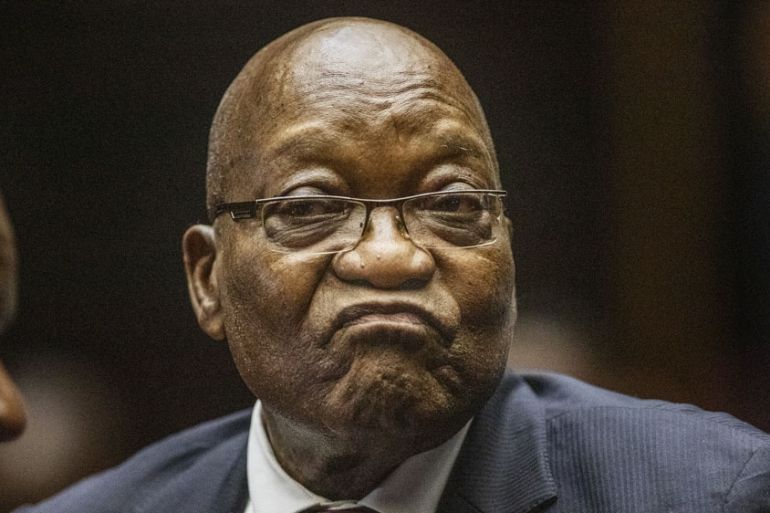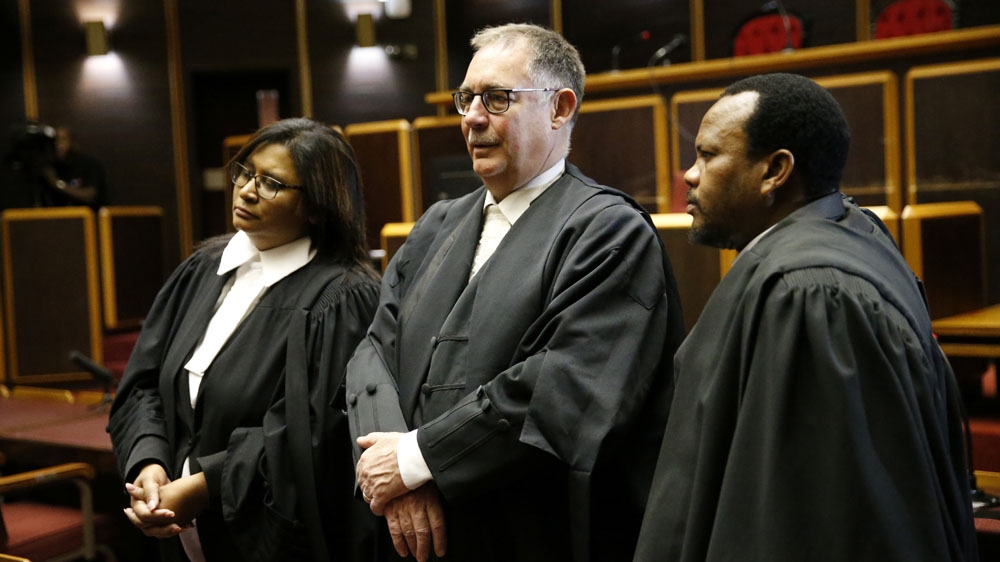Delay in Jacob Zuma’s case as former president plans appeal
Ex-South African president to appeal court ruling to deny him permanent stay of prosecution on corruption charges.

Pietermaritzburg, South Africa – A long-awaited corruption trial against former South African President Jacob Zuma has been postponed until next year after his legal team said it would appeal an earlier court decision to proceed with his prosecution on charges related to an arms deal.
“Mr Zuma intends to exercise the full extent of his constitutional right which is the right to appeal,” his lawyer Thabani Masuku said in his address to the judge in the Pietermaritzburg High Court on Tuesday.
Keep reading
list of 4 itemsCan Jacob Zuma and his MK party unseat the ANC in South Africa’s election?
South Africa deploys army to avert unrest after trucks torched
Heckling of President Ramaphosa triggers backlash in ruling ANC
On Friday, the same court had dismissed Zuma’s application for a permanent stay of prosecution lodged earlier this year.
Zuma has 15 days to submit an explanation as to why the prosecution should not be continued. The application will be heard on November 22.
Advocate Billy Downer, speaking on behalf of the state, said: “The state will obviously be opposing these applications.”
He suggested April as the new date for the trial in which Zuma has to respond to 16 charges of fraud, money laundering and racketeering related to the procurement of weaponry from European companies in the late 1990s, commonly known as the Arms Deal. The former president denies any wrongdoing.
Downer announced that the earliest date for the pre-trial will be February 4, adding that the state “will set in motion immediately the minutes for a full process of pre-trial”.
A new version of the forensic report regarding the matter had been filed to the judiciary, as well as the co-accused, French arms company Thales.
Directly after the hearing, a cheerful and relaxed Zuma addressed a few hundred supporters who had gathered outside the court building.
“We will come back, we will come back, we will come back,” he told the dancing and cheering crowd, referring to his intention to lodge an appeal.
Long-running saga
Zuma was first indicted with alleged corruption charges in connection with the procurement of arms from various European manufacturers, including Thales, in 2005.
The allegations against him comprise 783 dubious payments he allegedly received between 1996 and 2005 through his then-financial adviser Shabir Shaik, who was sentenced to 15 years in jail in 2005 for his part in the transactions.
Zuma, despite being fired as vice president in 2007 by then-President Thabo Mbeki as a result of the accusations, was cleared of all charges by the National Prosecuting Authority (NPA) in 2009.
The bribe money that allegedly flowed into Zuma’s pockets during that period totalled four million rand ($269,169) and was paid in exchange for his service to shield Thales from corruption investigations relating to their fraudulent involvement in the arms deal.

After repeatedly challenging the prosecutors, Zuma and Thales have managed to delay the day of trial for years until Friday, when the court dismissed the decision to set aside the charges in 2009 as “flawed”.
That ruling evoked hopes among opposition parties and anti-corruption campaigners that the trial was finally due to commence in a country that has long struggled with allegations of state capture and structural corruption. It was widely received as a milestone for the country to finally make a stance against corruption.
“One of the challenges we see in government is that people’s courage to speak up against corruption is undermined by the fact that there are no consequences,” said Dadisai Taderera, country director of the Accountability Lab South Africa, a global organisation promoting integrity among citizens.
“There have only been two cases in South Africa where high ranking politicians were prosecuted,” she said. “Other than that,” she added, “there is a general feeling from the general public that there is impunity.”
“The danger is now that it sends the message that if you have resources you can afford to evade justice.”
While organisations fighting corruption and promoting accountability, such as the Accountability Lab, see a further delay as a threat to the credibility of the South African court system, Zuma’s supporters reinforced their support and insisted that the accusations form part of a conspiracy against the former president led by external infiltrators.
“Our judiciary was captured,” said Cijimpi, a Zuma supporter dressed in a yellow shirt sporting the logo of Zuma’s African National Congress (ANC), after the court session.
“This is a vendetta against Zuma to bring him down.”